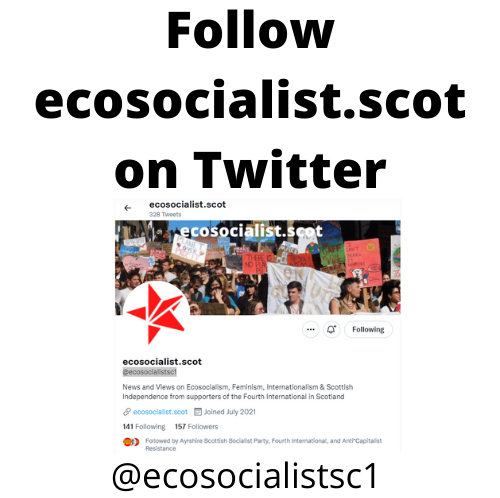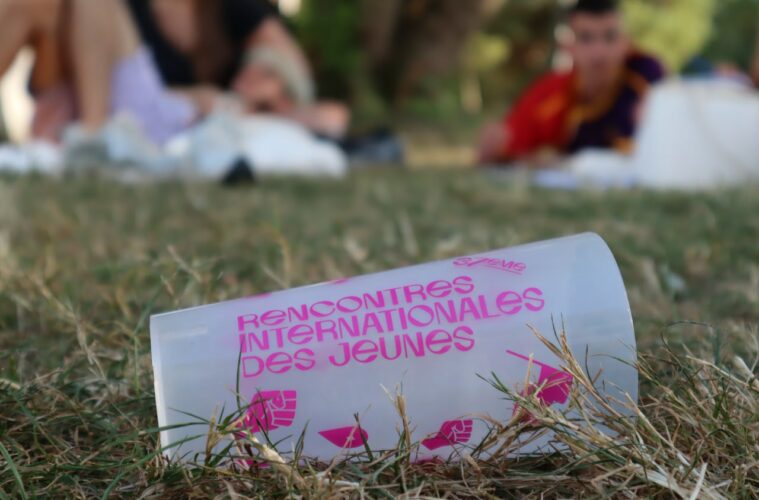You see, I am a transgender woman. But so far I have been a very cautious and closeted trans woman. I am really early on in my transition, and until recently the only people I have truly been myself around are fellow trans people from the queer movement. And even then, I’ve only presented as a woman in small gatherings of trusted friends and partners. But I decided that this time, at the camp, I was going to take a leap into the unknown: I was going to dress, present, live as the woman I really am, for the duration of the camp. I was going to introduce myself to my comrades.
It is a general point with me, that I do not take leaps into the unknown very often. I am one of those people who are very easily caught and stuck by indecision when it comes to big choices. I am a woman, but a fearful one. I want to show my face: I want to be known and thought of and spoken to and loved as a woman, but I am afraid. I am a woman, but most of the time I am silent and hidden, buried deep in the closet. So what led me to take a leap, for once?
Two things. Firstly, I was impressed by the Fourth International’s approach to identity issues. Not just their historical involvement in the feminist movement, but also the ongoing commitment to racial justice, feminism and queer struggle that I could see upheld in the various sections of the international. Of course, historical and programmatic commitments, while inspiring and appealing to a closeted trans woman like me, would not alone have been enough to convince me to bare myself so truthfully and openly.
It was the second thing that was decisive. It might seem small to you, reader, but it was simply getting the chance, a few months before the camp, to meet some members of the Danish section who introduced themselves with they/them pronouns. Here they were, some gender dissidents just like me, clear and queer among their fellow comrades without a worry. It occurred sharply to me, right then and there, that if I was just a little bit braver, I could be like that!
Well, that decided it. With a good deal of panicked, excited sincerity, I told those comrades about myself, I mean really, truly about myself, and told them that I wanted to come out at the camp. They were supportive and cheerful, and looking forward to knowing the real me when we met again in France. And so, I had now committed myself. I won’t lie: It was a decision I would worry and fret about as the camp drew near. This was natural, obviously. I was about to come out to about two hundred people, and across multiple language barriers too! Would I get tangled up in explaining myself? Would there be misunderstandings? Would some people turn out to be bigots? I had reason to be more than a little nervous: A depressing number of times in my years on the left, I have seen how easily some supposedly progressive “comrades” have dropped the act and morphed into reactionary dogs when challenged by actually-existing trans people with ideas and opinions.
However, I was also buoyed by a kind of feverish anticipation. The simple prospect of cutting the bullshit, dropping my boyish disguise and being totally honest seemed so radical, so wonderful, so liberating, that I could not wait to get to France. Besides, I knew full well that to be openly myself at the camp was a political commitment, not just a personal one. I am both a militant in a battle for my own civil rights and a socialist, and I feel it is my duty as a transgender socialist to do my best to bring together the causes of trans rights and socialism into one struggle. I firmly believe that the perspectives of trans people are valuable, and that the socialist movement is lessened by their absence, just as it is lessened by the absence of black perspectives or disabled perspectives. If the patriarchy tries to turn gender into a binary of bitterly opposed frontlines, then gender rebels like me are well positioned to show how these frontlines are vulnerable to permeation, sabotage and mutiny. We cannot be quiet, not when we have so much to give, so much to talk about, so much to teach. And so, I felt compelled to raise my voice: A woman’s voice, loud, sharp and liberated.
As the fateful date approached I made some preparations, like telling the other members of the Scottish delegation, and coming out to a few comrades I had already met. Their support and acceptance was a welcome boost, and it really cemented my resolve and confidence to know that they would have my back during the camp. And when, after the long journey down to the campsite, the time finally came to commit to things and reveal my true self, it was good to be able to take the first steps with some help from comrades. I remember, on the first morning of the camp, speaking with my delegation, airing out some last-minute nerves and making absolutely sure that, in the event of any exclusion or bigotry, I could count on them to help me assert my right to be there as the woman I am.
Thankfully though, all that worrying was completely needless. I got so hung up on potential issues and fears, only for them to dissolve the moment I walked out into the sun in a dress and began introducing myself. I don’t think I was prepared for how natural it all felt, as if I had been doing this my entire life. Whether it was a comrade who had previously met me as a “boy”, or whether it was someone entirely new, things went so smoothly that I was a little bit shocked. But only a little bit, because the dominant emotion I felt was joy – pure, riotous, joy.
This wonderful feeling would develop into a deep sense of fulfilment as the days passed. Yes, as one of a handful of trans women at the camp, I was in an extreme minority, but it hardly felt that way. On the contrary, the blanket response of my sisters was to welcome and include me, and as I spent time participating in the women’s discussion spaces, learning, sharing ideas and helping to plan actions, I came to realise some things: chiefly, that this was the first time I properly felt a part of a women’s movement.
I am a feminist. The problem is though, that the feminist movement in Scotland and the UK is in a parlous, disorganised state compared to the women’s movement in the rest of the world. Feminism in these gloomy islands can’t boast of mass, vibrant, militant women’s strikes and demonstrations in the way that Argentinian or Portuguese or Polish or Chilean feminism can. In addition, the feminist movement here is so riven by culture war junk and middle class transphobia, that it feels pretty difficult for a trans woman like me to feel safe or welcome taking part in what little we have. There is that constant worry with the movement back home, a lingering fear that solidarity is something that can easily be revoked when the sister doesn’t fit some arbitrary biological or social norm.
I had no such worries among the women at the camp. Here I experienced live, determined, militant sisterhood, a sisterhood ferocious in combat yet caring and inclusive towards its own, a sisterhood committed to mass revolutionary struggle. And I was welcome implicitly, no questions asked! As I sat in meetings surrounded almost totally by cisgender women, I felt utterly at ease, a circumstance which honestly surprised me. I reflected that, were I in a similar setting in the UK, I would be a lot more nervous and on-edge, the familiar fear gnawing at me and making me wonder whether my inclusion might suddenly be subject to withdrawal on some bigot’s whim. But here, among revolutionary socialist women, I was as much a woman as any other, a comrade to be loved and supported.
And this love and support helped me realise something else, too: The sheer difference which living in an honest manner makes to my ability to express emotions. I’ve long been aware of how enforced masculinity has marked and scarred me in various ways. Throughout childhood, I was conditioned, punished and harassed into acting and thinking like a boy by various forces, whether they be the ways patriarchal society moulds the minds of children to adopt certain gender roles, the way kids learn to laugh at girly “faggots” and “trannies”, or the way an overly emotional child is relentlessly bullied for being “soft” and “effeminate”, too much of a “crybaby”. This prolonged campaign against the personality of the child induces a painful kind of alienation- Confused and afraid, bombarded by the world around you, the easiest response is just to give in and try and fit the role as well as you can, even if it means doing as the oppressor wants and shutting away parts of yourself. Sure, it might make you less of a target, and you might be convinced that it’s better to try and be “normal” and “just like the other boys”, but it never, ever, feels right. Even though you can’t put your finger on what’s wrong and why you feel so at odds with yourself, you simply cannot ignore the pain, no matter how much you scream at yourself to shut up and conform. It’s hard to be at peace when you’re mutilating yourself.
This is something that you gradually confront as you begin to wake up and process the fact that you’ve been brainwashed, but you really do not realise the extent to which your identity has been dulled by living a lie until the burden of the lie is gone. It’s something I’ve been approaching as I’ve shared my womanhood with loved and trusted friends, but the scale, duration and public nature of my doing so at the camp, and in front of so many cis people simultaneously, affected me in ways I hadn’t prepared for. It shook me, but in the most wonderful way possible. Living so naturally and freely as a woman was like coming home to myself. Suddenly, I was so much less inhibited and so much more confident in expressing my feelings and emotions. Years of self-censorship and self-scrutiny have led me to mentally check myself in countless ways whenever I’m with other people, but here I didn’t need to think about how I acted and expressed myself at all- Everything just flowed naturally.
So here I was, accessing those alienated parts of my personality that had been walled off and hidden by a childhood of having to be a boy. Here I was: A confident, affectionate, goofy, relaxed woman, perfectly at ease among her sisters and comfortable in her own skin. It felt so good to throw all the old defense mechanisms, all the nerves, all the congealed boy shit- in short, all my chains- right into the trash. How lightly you breathe when you aren’t chained down!
This is what made the Youth Camp so special for me. I think it speaks to the way that the Camp functions as a space for a kind of pre-figurative politics, a way of testing out some elements of socialism via collective, co-operative living. The ability to express yourself exactly as you wish to at the Camp, there among your fellow militants, is a miniature of that limitless expression of the human personality that will be the right and freedom of everyone under socialism. I may be back in Scotland now, and I may be remaining quite closeted for the time being, but I nevertheless see the camp as marking an important milestone in my transition. It has inspired me, and given me strength and determination. I have had a sample of full, liberated womanhood, and I want it every day of my life. Yes, the world will not always receive me as enthusiastically as my comrades have done, and yes, the struggle for freedom will be long and difficult, but I also know what’s at stake and what’s to be won, if only I, we, all of us women dare! And I know that it can only be so through collective, revolutionary sisterhood. We will go forward over the corpse of the patriarchy, arms linked and voices raised as one.
Our bodies, our choice!
Every woman a sister, every sister a revolutionary!
8 September 2022
Sister from Scotland is a Fourth International supporter.
Article also published by International Viewpoint & Anti Capitalist Resistance:
https://internationalviewpoint.org/spip.php?article7813
https://anticapitalistresistance.org/being-a-transgender-woman-at-the-international-youth-camp/




